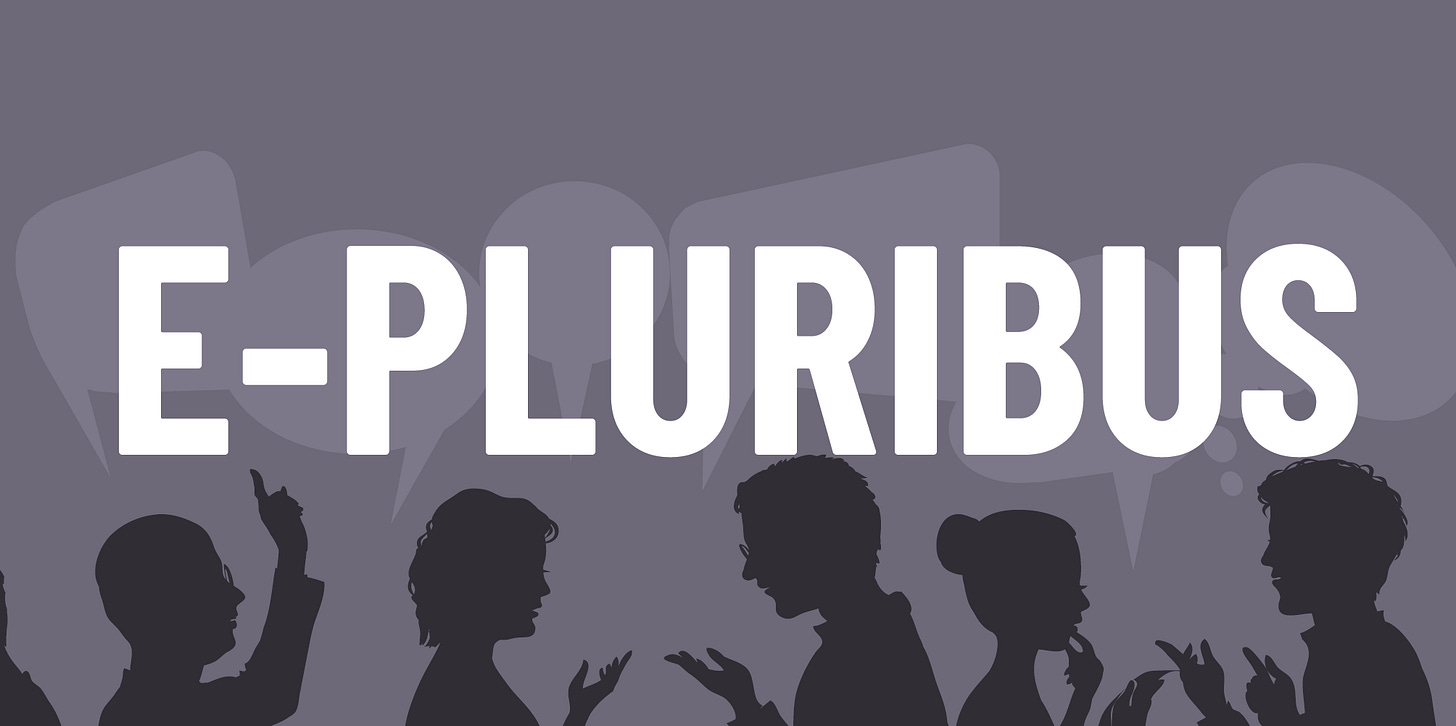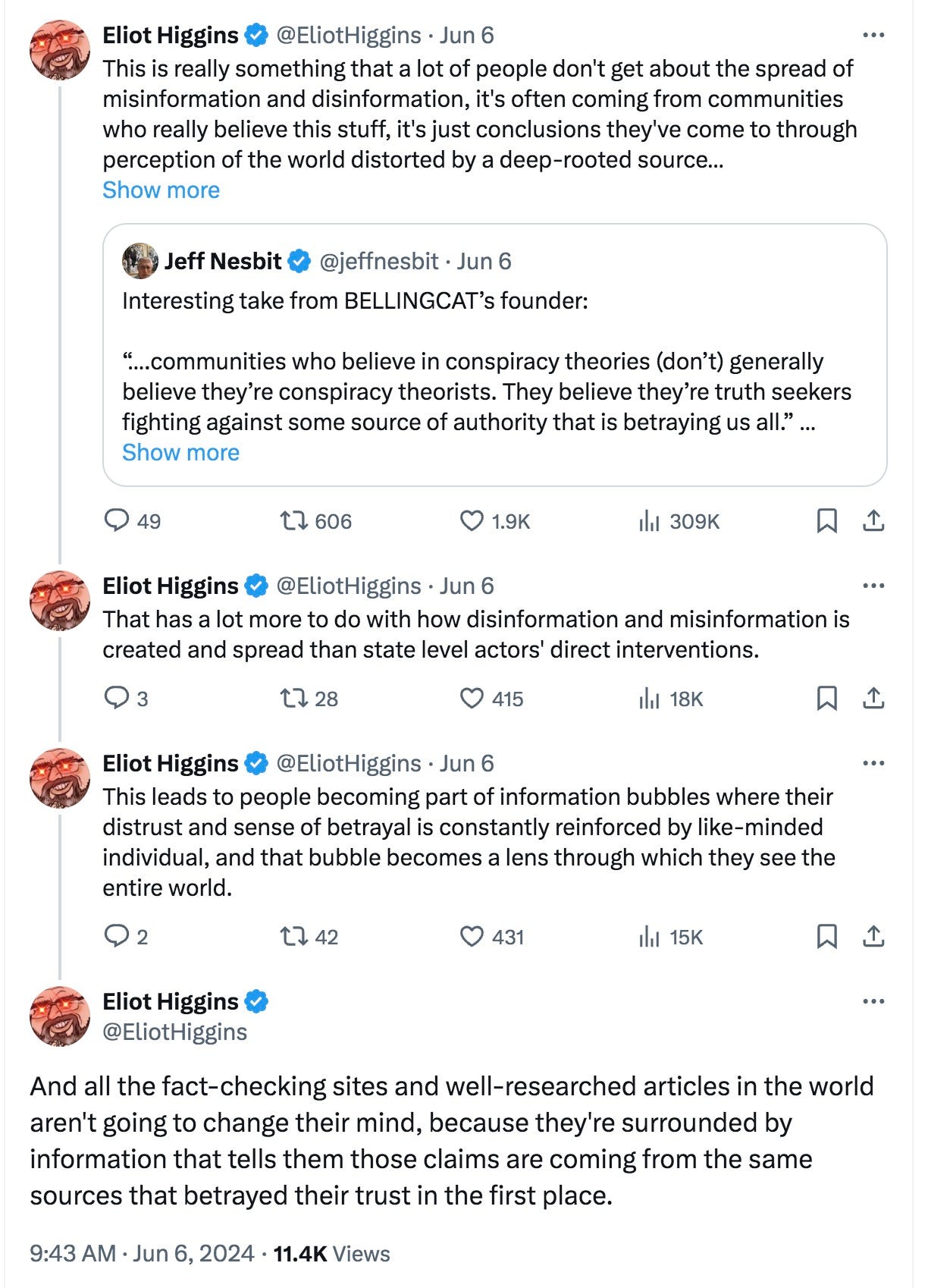E-Pluribus | June 7, 2024
The European Union aims at "hate" and hits free speech; misinformation about disinformation; and tired of executive overreach? Try federalism.
A round-up of the latest and best musings on the rise of illiberalism in the public discourse:
J.D. Tuccille: Report: E.U. Censorship Laws Mostly Suppress Legal Speech
The First Amendment often seems to strike Europe as unnecessarily generous in the freedoms it guarantees, and recent laws in the Old World are driving home the point. J.D. Tuccille at Reason writes that, rather than simply targeting (what is now) illegal speech, these broad brushes are stifling legal speech as well.
Among those who think the United States is an unseemly cesspool of unrestrained opinions voiced by those people, Europe is often touted as an alternative for speech regulation. European Union law, following in the footsteps of national legislation, imposes enforceable duties on private platforms to purge "hate speech" and "disinformation"—or else. But free speech advocates warn that these laws are clumsy and dangerous tools that threaten to muzzle expression far beyond the bounds of their nominal targets. They're right, and they now have receipts.
In a new report, Preventing "Torrents of Hate" or Stifling Free Expression Online?, The Future of Free Speech, a think tank based at Vanderbilt University, points out that online regulation changed in 2017 with Germany's adoption of the Network Enforcement Act (NetzDG), "which aimed to combat illegal online content such as defamation, incitement, and religious insults." That law inspired lawmakers around the world, as well as similar E.U.-wide legislation in 2022 in the Digital Services Act (DSA). "The underlying assumptions surrounding the passage of the DSA included fears that the Internet and social media platforms would become overrun with hate and illegal content," notes the report.
[. . .]
"Legal online speech made up most of the removed content from posts on Facebook and YouTube in France, Germany, and Sweden," according to the report. "Of the deleted comments examined across platforms and countries, between 87.5% and 99.7%, depending on the sample, were legally permissible. The highest proportion of legally permissible deleted comments was observed in Germany, where 99.7% and 98.9% of deleted comments were found to be legal on Facebook and YouTube, respectively."
[. . .]
Given the prospect of massive fines and even outright proscription from Europe, it's no wonder that internet companies might be a little overenthusiastic about yanking content from their servers. It's not exactly heroic, but it's certainly safer to field public complaints and criticism from civil liberties groups than to draw the attention of sniffy and punitive Eureaucrats.
Read it all.
Holman W. Jenkins, Jr.: America’s Disinformation Wrong Turn
H. L. Mencken is credited with the observation that nobody ever went broke underestimating the intelligence of the American people. At the Wall Street Journal, Holman W. Jenkins, Jr. takes a contrary position when it comes to the media’s assumption that Americans aren’t smart enough to detect misinformation.
Let’s not succumb to motivated hype about Russian influence in the 2024 election. Not hyperbole, not even a slight exaggeration for effect: A Russian propaganda video is a drop in the ocean compared with tens of millions of videos posted on YouTube, TikTok, Instagram and other sites daily.
Its effect is small and inevitably ephemeral unless and until the New York Times, the Economist and MSNBC make a fuss about it to their news audiences as an example of Russian disinformation activities.
[. . .]
Our fuss about Russian social-media operations mainly lets foreign trolls claim to their paymasters they are getting something for their money. It follows, then, that Americans who overreact to Russian influence are doing Russia’s work for it.
Stop fanning the “hype cycle,” Mr. [Gavin Wilde of the Carnegie Endowment for International Peace] advises. Engage in “strategic ignoring” by recognizing that hostile actor efforts online mostly are a drop in the bucket.
Worry instead about direct foreign lobbying and foreign money in our politics. Worry about “folks tied to the [U.S.] intelligence and security agencies interacting with political campaigns.”
Don’t picture the public as “hapless dupes” whose political behavior is so easily explained by online memes. This “pessimism” about our democratic “resilience,” about its ability to tolerate “misconceptions” and “skullduggery,” makes us sound more like Moscow than ourselves, with the Kremlin’s “simplistic” notions of thought control and manipulation.
[. . .]
Which brings me to a point I’ve made before: In a world of deepfakes, if five or six major corporate news outlets with time-honored brands could be counted on to affirm truths because they were truths, it would be a boon to society.
Read the whole thing.
Ilya Somin: American Federalism Can Push Back Against Executive Overreach
Since America’s founding, the president and Congress have struggled for the upper hand. With too much acquiesce from the latter, the executive branch has assumed a tremendous amount of power. At The Unpopulist, Ilya Somin argues that our federalist system gives us the tools to rein in the president, if we’d only use them.
Since Donald Trump’s victory in the 2016 election, “sanctuary” jurisdictions have become a focus of political and legal controversy. Sanctuary policies are adopted by state and local governments that refuse to aid federal officials in enforcing certain federal laws. They can be thought of as attempts to build a type of legal wall around a state or municipality.
[. . .]
While sanctuary policies enable states to deny assistance to federal efforts to enforce laws against private parties, it is important to recognize that they do not empower states to violate federal laws themselves. States cannot use such policies to prevent the federal government from, for example, suing them for violating citizens’ constitutional rights. Nor can they use sanctuary laws to eliminate constitutional rights directly.
Legal and political conflict over sanctuary laws is likely to continue in the future. Should Trump prevail in the 2024 election, a second Trump administration plans to engage in a massive deportations of undocumented immigrants and would almost certainly make a renewed effort to coerce immigration sanctuaries. Hopefully, these will run afoul of the same constraints that undermined first term efforts.
[. . .]
Politicians’ and activists’ positions on sanctuary laws often reek of “fair weather federalism.” Their stances depend on whose ox is being gored. Supporters of immigration sanctuaries oppose gun sanctuaries, and vice versa, even though the constitutional issues in the two types of cases are very similar.
But there are good reasons to support state and local rights to adopt sanctuary policies that go beyond one’s specific policy preferences. If the federal government has broad power to force states to do its bidding, that power could easily be abused—especially in an era where there is severe ideological polarization, and many on both sides of the political spectrum are eager to coerce their adversaries.
The danger is heightened by the ways in which such power is likely to be concentrated in the hands of the executive. If the president can use vaguely worded laws to attach new conditions to federal grants, as Trump tried to do, he could easily use that to consolidate power and impose his own preferences on unwilling states and localities.
The case for sanctuary policies is even stronger if you fear that Trump—or some other potential future president—has authoritarian tendencies. Sanctuary jurisdictions can make such authoritarian aspirations harder to realize by giving refuge to the would-be dictator’s opponents.
Even when there is no authoritarian threat looming, sanctuary policies play a valuable role in preserving diversity in our federal system. In a highly diverse nation like the U.S., federally imposed uniformity would deny millions of people the opportunity to live under policies they prefer.
Sanctuary policies also help empower people to “vote with their feet” for the policies they prefer. People who dislike their home state’s policies on immigration, guns, or some other issue, have the opportunity to relocate to a more congenial jurisdiction. Where authority devolves to local governments, foot-voting opportunities are even greater, as it is often cheaper and easier to move between local governments than between states.
Read it all here.
Around Twitter (X)
Fish don’t know they’re in water - it’s all around them. Similarly, says Eliot Higgins of Bellingcat, conspiracy theorists believe they are the ones who see through the lies rather than spreading their own misinformation.
When is a “spectrum” not much of a spectrum? Colin Wright & Wesley Yang tag team on this one:
And finally, earlier this week, we featured an essay from the Cato Institute’s David Boaz. Today, Cato announced Boaz’s passing:










